There have been many great players who have donned the Philadelphia Flyers sweater over the years, with a few even going into the Hockey Hall of Fame. There are two men, though, who are franchise-defining talents in their respective eras for the hockey club and are interwoven with the history of the Orange and Black. Those two are Bobby Clarke and Eric Lindros. Both were faces of the franchise who gained NHL fame for what they were able to accomplish on the ice. While both men have long since retired, they helped make history and shape the league into what it is today.
Bobby Clarke
Clarke might as well be called Mr. Flyer for everything that he has done for the organization. He was drafted by the team back in 1969 and only played for Philadelphia. He became the centerpiece in an era that was rough-and-tough. The team played an aggressive style of hockey, leading to the nickname “The Broadstreet Bullies.” Clarke also became captain of the franchise and wore that “C” during some of the best times in the organization’s history, being one of the most iconic leaders in Philadelphia sports.
Related: Flyers’ All-Decade Team
Clarke suited up for the Flyers from 1969 until 1984. He led the team to two straight Stanley Cups, defeating Hall of Fame defenseman Bobby Orr and the Boston Bruins in 1974 and repeating against forward Gilbert Perreault and the Buffalo Sabres in 1975. Looking at the stats, he hit the 100-point plateau on three occasions (1972-73 with 104, 1974-75 with 116, and 1975-76 with 119).
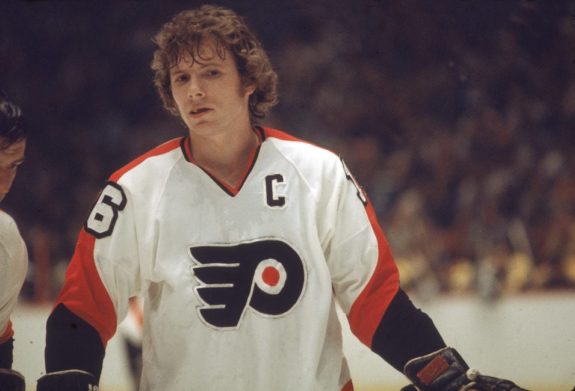
His total stats are the following:
- 1969-70: 15 goals and 31 assists for 46 points in 76 games
- 1970-71: 27 goals and 36 assists for 63 points in 77 games
- 1971-72: 35 goals and 46 assists for 81 points in 78 games
- 1972-73: 37 goals and 67 assists for 104 points in 78 games
- 1973-74: 35 goals and 52 assists for 87 points in 77 games
- 1974-75: 27 goals and 89 assists for 116 points in 80 games
- 1975-76: 30 goals and 89 assists for 119 points in 76 games
- 1976-77: 27 goals and 63 assists for 90 points in 80 games
- 1977-78: 21 goals and 68 assists for 89 points in 71 games
- 1978-79: 16 goals and 57 assists for 73 points in 80 games
- 1979-80: 12 goals and 57 assists for 69 points in 76 games
- 1980-81: 19 goals and 46 assists for 65 points in 80 games
- 1981-82: 17 goals and 46 assists for 63 points in 62 games
- 1982-83: 23 goals and 62 assists for 85 points in 80 games
- 1983-84: 17 goals and 43 assists for 60 points in 73 games
In total, Clarke played in 1,144 games and accumulated 1,210 points in that timespan (358 goals and 852 assists). He retired in 1984 and was inducted into the Hockey Hall of Fame in 1987. Also, he had a stint as general manager of the Flyers many years later. He is currently the overall Flyer leader in both assists and in overall points.
Eric Lindros
Eric Lindros had a bit of controversy on his way to joining Philadelphia. He was originally selected first overall in the 1991 NHL Draft by the since-relocated Quebec Nordiques. It had been made known prior to the draft that Lindros would not sign to play with the Nordiques, but the organization went ahead and selected him anyway.
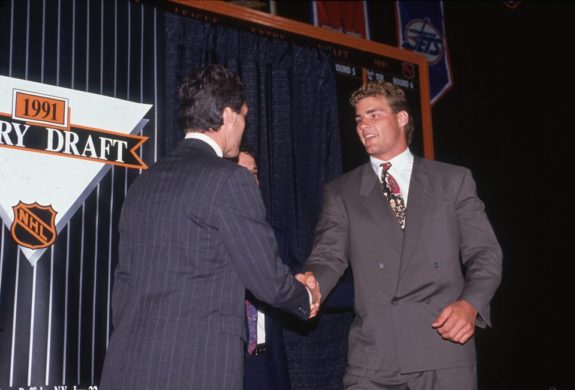
Lindros refused to play for Quebec and held out from playing in the NHL for an entire year. The Nordiques decided to move on and he was traded in a blockbuster deal to the Flyers.
The official trade was Lindros going to Philadelphia for forward Peter Forsberg, goalie Ron Hextall, forward Mike Ricci, defenseman Steve Duchesne, defenseman Kerry Huffman, $15 million in cash, a first-round pick in 1993 (which turned into goalie Jocelyn Thibault). Later on, forward Chris Simon and a first-round pick in 1994 (which became defenseman Nolan Baumgartner) were added to the deal. It was quite a haul for the Flyers to give up, but they were able to land a guy who could step in and be the face of their franchise going forward.
Related: 5 Forgotten Picks of the 2008 NHL Draft
Lindros accomplished quite a bit during his tenure as a Flyer. He was named captain, and like Clarke, played a vital role in the team making it to the Stanley Cup Final. However, they would lose the Cup in 1997 to Steve Yzerman and the Detroit Red Wings, getting swept in four games.
Statistically, Lindros tallied at least 70 points every single season except for one while in Philadelphia. His best total came during the 1995-96 campaign, where he chalked up 47 goals and 68 assists for 115 points. This is the only time he ever hit the 100-point plateau, although he came close during his sophomore season (racking up 97 points).
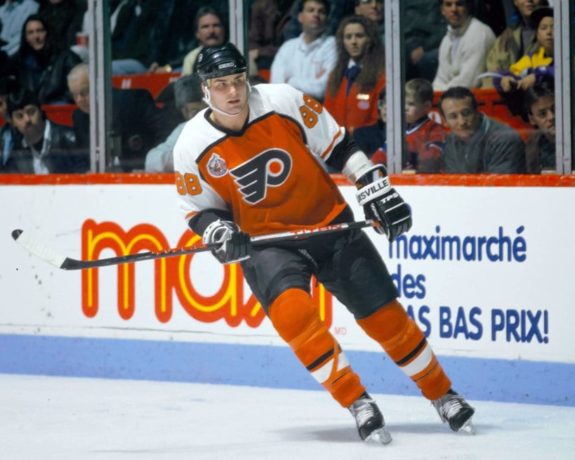
His totals during his time as a Flyer are below:
- 1992-93: 41 goals and 34 assists for 75 points in 61 games
- 1993-94: 44 goals and 53 assists for 97 points in 65 games
- 1994-95 (lockout-shortened season): 29 goals and 41 assists for 70 points in 46 games
- 1995-96: 47 goals and 68 assists for 115 points in 73 games
- 1996-97: 32 goals and 47 assists for 79 points in 52 games
- 1997-98: 30 goals and 41 assists for 71 points in 63 games
- 1998-99: 40 goals and 53 assists for 93 points in 71 games
- 1999-00: 27 goals and 32 assists for 59 points in 55 games
Lindros’ total points during his tenure was 659 (290 goals and 369 assists). He was traded to the New York Rangers in 2001 after sitting out the 2000-01 season. The general manager who traded him was none other than Clarke himself. Lindros continued his NHL career playing with the Rangers, Toronto Maple Leafs, and Dallas Stars before hanging up the skates in 2007. He was inducted into the Hockey Hall of Fame in 2016.
Leaders on Their Own Lines
One similarity of both Clarke and Lindros was that they were pieces in what became very famous lines throughout the league. Clarke during his days as a Flyer teamed up on a line with wingers Bill Barber and Reggie Leach — this group became known as the L-C-B Line. They were a solid threat for whatever team matched up against them and made a huge impact in bringing Stanley Cup glory to the organization in both 1974 and 1975.
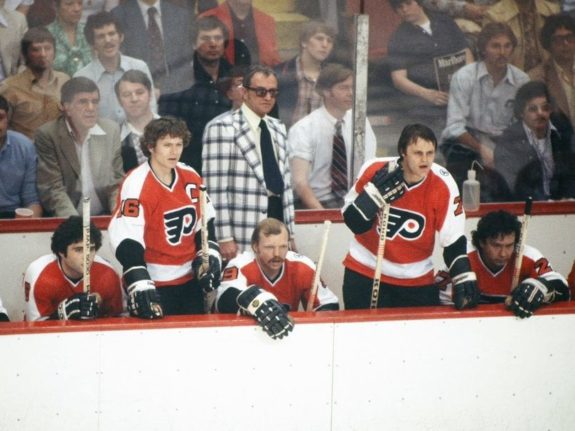
For Lindros, he actually was on two lines that constantly plagued opposing lineups during the mid-1990s. He centered wingers John LeClair and Mikael Renberg in what was known as the “Legion of Doom” line. They provided lethal offense, and all combined for a total of 305 goals and 361 assists for 666 points in 547 regular-season games between 1995 and 1997. The trio also played a big factor in taking the Flyers to the previously mentioned 1997 Stanley Cup Final. In the postseason overall, the “Legion of Doom” suited up for 132 games, tallying 56 goals and 74 assists for 130 points.
The other line Lindros famously worked on actually occurred before there was any “Legion of Doom.” The line was called “The Crazy Eights Line,” and it consisted of Lindros and fellow teammates at-the-time Mark Recchi and Brent Fedyk. It seemed that whatever line Lindros was put on, he instantly made better. The same can be said for Clarke, too. Both brought a lot of talent by themselves to whatever lines they were on.
Accolades
Both Lindros and Clarke have walked away with their fair share of awards. In Clarke’s case, putting aside the two Stanley Cup championships, he made the All-Star Game on eight occasions throughout the 1970s. He is also a three-time Hart Trophy winner. Besides these, he has won the Selke Trophy, Bill Masterton Memorial Trophy, and the Lester B. Pearson Award (which has since been renamed to the Ted Lindsay Award) along with other honors.
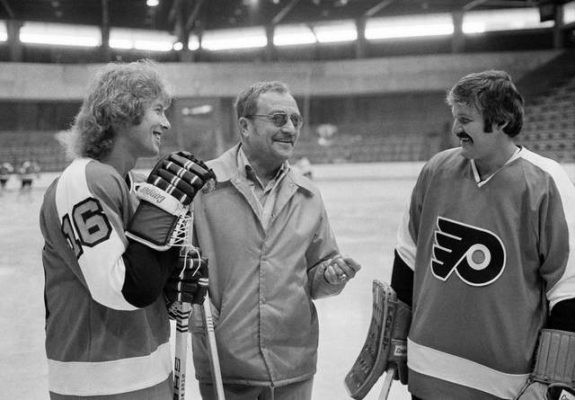
Lindros, while never winning the big prize, made seven All-Star Game appearances. Also, like Clarke, he won a Hart Trophy and a Lester B. Pearson Award among other accolades.
Both players have also had their respective numbers retired by the Flyers (Clarke having worn number 16 and Lindros wearing 88), and were both included in the 100 Greatest NHL Players list honor that the league did for its centennial season.
Legends in the City of Brotherly Love
Both of these men are iconic legends who have poured their blood, sweat, and tears into hockey and representing the Flyers and the city of Philadelphia. Clarke and Lindros are both national ambassadors of the game of hockey, and all of the accomplishments throughout their careers have earned them all of the praise that they deserve. When someone thinks of Flyers hockey history, two of the first men I think of who symbolize their eras are Clarke and Lindros. They are two of the best to ever do it in a Flyers sweater.
With all of that being said, when it comes down to which player was better, Clarke wins. He spent his entire career with the Flyers organization, put up more stats during his time with the team as a result, and was able to help Philadelphia seize their two Stanley Cups. The only Cups the franchise ever won was when Clarke was at the helm leading the team through games. This is not to take away anything that Lindros has accomplished with the Flyers or in the NHL in general, but between the two, Clarke wins this showdown.